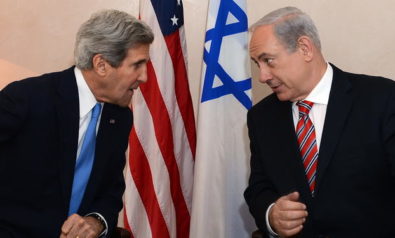Failure to reach an Israeli-Palestinian peace settlement could be catastrophic.
In April 2013, US Secretary of State John Kerry made clear his opinion on the necessity of peace talks between Israelis and Palestinians, elucidating his dedication to the current negotiations. He stated:
"I can guarantee you that I am committed to this, because I believe the window for a two-state solution is shutting. I think we have some period of time — a year to a year-and-a-half to two years, or it's over… So there's an urgency to this, in my mind, and I intend, on behalf of the president's instructions, to honor that urgency and see what we can do to move forward."
Secretary Kerry's statements are reminiscent of the widely repeated trope that there is a rapidly dwindling timeframe for a negotiated solution to the Israeli-Palestinian conflict. Often used as a scare tactic to emphasize the vital nature of bringing about peace, the "two-state solution window" narrative does not clearly spell out what exact steps or time limit will render peace impossible.
For this exact reason, this article does not attempt to make a comment on the longevity of the opportunity for two-states, but instead about the possible and destructive ramifications of the current peace talks' failure.
While perhaps this is not the last chance for the two-state solution, if these nine-month negotiations do not end in a resounding success, the fallout could cripple the peace process for the foreseeable future.
Palestine's Political Strategy
During August 2013, I had the opportunity to hear policy leaders conjecture specifically on these predicted consequences while traveling through Washington DC, New York, Israel, the West Bank, and Jordan. My organization, the Olive Tree Initiative (OTI), entered into meetings at the White House and State Department the same day that negotiations began in Washington DC, and landed in Jerusalem the day the diplomatic entourage moved to the Middle East.
Thus, we were inundated with discussion about the talks from every direction. However, one argument from a Palestinian official struck me as particularly cogent, portending the future of Palestine’s political strategy and the possible impending collapse of the international system as we know it.
Husam Zomlot, the executive deputy commissioner for Fatah's Commission for International Affairs, met with OTI and spoke of the overwhelming complacency the conflict has engendered, and his resulting trepidation going into the current negotiations. Citing the then recent announcement of 1,200 settlement units, he questioned Israel's dedication to a two-state solution as well the United States' willingness to pressure its ally for peace.
Recent developments of Israel's declaration of a new security wall in the Jordan Valley, the suggestion that the current separation barrier would replace the 1967 Green Line as a starting point for negotiations, and continued settlement expansion have further thrown Israel's motivations and the efficacy of America's influence into question.
To Zomlot, these actions reflect an undermining of Palestinian national sovereignty and dedication to maintaining the status quo in Israel.
"Bringing Israel to its Senses"
To challenge the counterproductive strategies of the Israeli government and the seeming ambivalence of the Israeli public, he calls for the need to "create a sense of crisis, of bloodless pain," and of urgency to "bring Israel to its senses, not to its knees."
In doing so, he argues that the Palestinian National Authority (PNA) should not wait for the US to broker a solution, but should press beyond its success in the 2012 United Nations (UN) bid. If these talks fail, Zomlot stated that the PNA will return to the UN, seek full recognition, join all UN bodies, and bring a case against Israel to the International Criminal Court (ICC).
It seems that Zomlot's words were an accurate indication of the pulse of the Palestinian government, as these sentiments were echoed on December 2, 2013 by President Mahmoud Abbas, who stated:
"The [peace] talks are going through great difficulties because of the obstacles created by Israel. If we don't obtain our rights through negotiations, we have the right to go to international institutions. The commitment to refrain from action at the UN ends after the nine-month period agreed for talks."
Bearing in mind the ramifications for the 2012 UN bid, Secretary Kerry and the international community should be incredibly wary of this alternative option and push for a peace settlement at all costs.
On the one hand, a Palestinian pursuit of prosecution at the ICC and an effort to update their status at the UN could result in dire consequences for the Palestinian people, as the past UN bid resulted in Israel's withholding of $120 million of tax revenue collected on behalf of the PNA.
However, an even more explosive dilemma could land in the lap of the international community, courtesy of the US Congress.
According to 22 USC 287e, as amended by PL 101-246:
"No funds authorized to be appropriated by this Act or any other Act shall be available for the United Nations or any specialized agency thereof which accords the Palestine Liberation Organization the same standing as member states."
This law took its full effect after the United Nations Educational, Scientific, and Cultural Organization (UNESCO) voted 107 to 14, with 52 abstentions, to recognize Palestine's bid for full membership. While the US provided around 22% of UNESCO's budget, failure to pay dues resulted in the removal of the United States' voting rights in that body last November.
Potential Overturning of the International Order
Unless the peace talks succeed, the law changes or if Zomlot and Abbas are misleading us, the outcome could be catastrophic.
Jonathan Schanzer, vice president for research at the Foundation for Defense of Democracies, claimed: "We know that the Palestinians are going to go back to the UN… They have applied, or let's say they set the wheels in motion, for roughly 50 new agencies they'd like to apply to."
If Schanzer is indeed correct and the Palestinians expand their efforts in joining other UN organs, there could be a substantial and automatic defunding of the UN that would render countless vital services defunct.
Additionally, the retraction of America's monetary assets and the denial of voting rights would equate to a massive loss of US influence on the world stage, effectively overturning of the international order as we know it.
Finally, if a case in the ICC was to be successful in pursuing justice for the Palestinians, it would crystallize Israeli resistance to renewed talks, perhaps shutting the doors for a negotiated solution for years into the future.
Thus, while the two-state solution may not have reached its natural expiration date, if this nine-month negotiation period does not deliver, hope for peace in our time may be as good as dead.
The views expressed in this article are the author's own and do not necessarily reflect Fair Observer’s editorial policy.
Support Fair Observer
We rely on your support for our independence, diversity and quality.
For more than 10 years, Fair Observer has been free, fair and independent. No billionaire owns us, no advertisers control us. We are a reader-supported nonprofit. Unlike many other publications, we keep our content free for readers regardless of where they live or whether they can afford to pay. We have no paywalls and no ads.
In the post-truth era of fake news, echo chambers and filter bubbles, we publish a plurality of perspectives from around the world. Anyone can publish with us, but everyone goes through a rigorous editorial process. So, you get fact-checked, well-reasoned content instead of noise.
We publish 2,500+ voices from 90+ countries. We also conduct education and training programs
on subjects ranging from digital media and journalism to writing and critical thinking. This
doesn’t come cheap. Servers, editors, trainers and web developers cost
money.
Please consider supporting us on a regular basis as a recurring donor or a
sustaining member.
Will you support FO’s journalism?
We rely on your support for our independence, diversity and quality.












Comment